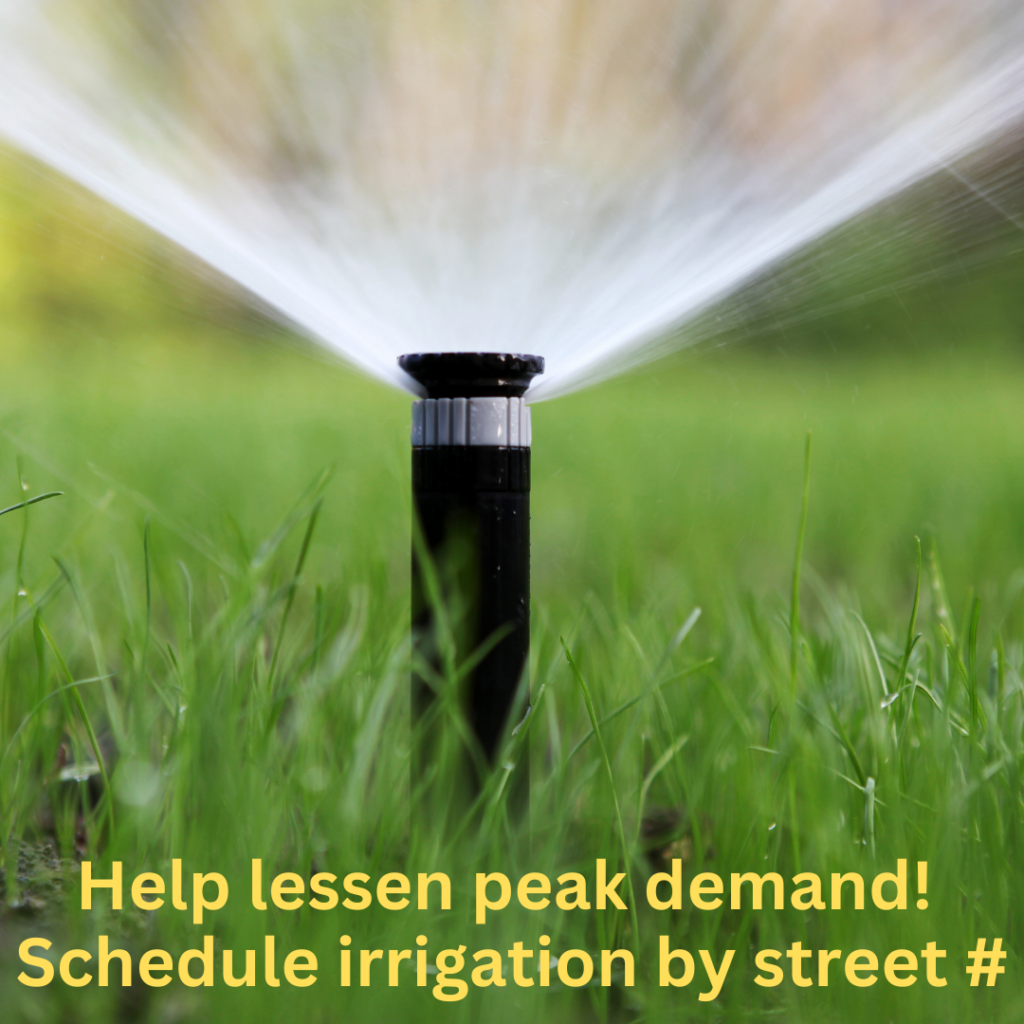At Your Service
Lawn irrigation is a huge drain on the city’s water supply. During hot summer days when thousands of additional people are in town, the additional use required for lawn irrigation can occasionally cause the city’s supply to drop to levels that are of concern.

Schedule Your Irrigation by Street Address
The city requests that year-round property owners schedule irrigation by street address:
- odd-numbered addresses:
Monday, Wednesday, Friday - even-numbered addresses:
Tuesday, Thursday, Saturday
Save Money, Save Water – and Help Save the Earth
The average person uses 80-100 gallons of water every day. Consider all of the things that you use water for: bathing, cooking, washing, recreation, and drinking. Yes, 71% of Earth is covered by water, but only 3% of the planet’s water is fresh water, and less than 1% is available for drinking.
There are several reasons why it’s important to conserve this vital resource. Water conservation helps:
- minimize effects of droughts and water shortages
- guard against rising costs and political conflict
- preserve our environment and protect our ecosystem and wildlife
- make water available for recreational purposes
- build safe and beautiful communities.
To help our water customers save money – and water – the City of Rehoboth Beach has collected several tips from various conservation websites.
In the Bathroom
- Check all faucets, pipes, and toilets periodically for leaks. Check your flapper periodically, too, to make sure it’s fitting tight.
- Install low-flow, high-efficiency toilets and faucet aerators as well as water-saving shower heads.
- Don’t use the toilet as a wastebasket.
- Take shorter showers (5 minutes max) or a bath. Or consider turning off the water while soaping and scrubbing and turning it back on briefly to rinse.
- Turn the water off while shaving or brushing your teeth.
- When washing your hands, turn off the water while you lather.
In the Kitchen and Laundry
- Only run the washing machine when it’s full or select the proper water level for each load.
- A front-loading washer uses 1/3 less water than a top-loading machine.
- Only run the dishwasher when it’s full, and if your dishwasher has it, use the water-saver cycle.
- Don’t let the faucet run while you clean vegetables.
- Rinse dishes in a pan rather than under running water
- Defrost food in the refrigerator rather than running it under water.
- Keep a bottle of drinking water in the refrigerator, that way you don’t have to run the tap water until it cools.
- Minimize use of the garbage disposal.
Lawn Care
- Water your lawn only when it needs it – rainfall reduces the need for watering. Step on the grass and then move your foot, if the grass springs back, it doesn’t need water.
- When you do water your lawn, water it for long enough for water to seep into the roots.
- Water in the cool parts of the day – early morning is better than dusk.
- Use an automatic irrigation system.
- Do not water the pavement.
- Spot-water the drier areas of your yard rather than the entire yard.
- Consider drip irrigation systems around trees and shrubs.
- Weed your lawn. Weeds are water thieves.
- Be willing to live with a less lush lawn.
- Apply the minimum amount of fertilizer needed.
- Mow as infrequently as possible and never remove more than one-third off the leaf blade in one mowing.
- Plant drought-resistant shrubs and trees.
- Use a broom – not a hose – to clean driveways, sidewalks, and steps.
- Reuse rainwater by capturing it in a rain barrel or cistern.
Other Tips
- When giving pets fresh water, use the old water on plants instead of pouring it down the drain.
- Use a bucket of water to wash your dog or family car; don’t leave the hose running. Or take your car to a commercial carwash.
- Encourage children to find another way to play rather than with a hose or sprinkler.
- Monitor your water bill. Unusually high usage may indicate a leak.

